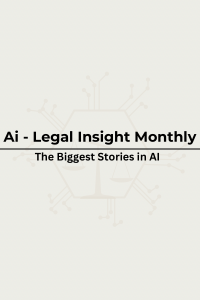Welcome to the AI-Legal Insight Monthly News Roundup!
Each month, we bring you the biggest AI and legal developments – tech breakthroughs, regulatory battles, and everything in between.
March 2025 has once again proven: AI isn’t just having a moment — it’s setting the entire agenda. From bold political moves in Brussels to jaw-dropping product launches and provocative protests, artificial intelligence continued to shape the headlines, the markets, and even the art scene. This month made one thing clear: AI is no longer just a tech trend, it’s a geopolitical, economic, and cultural heavyweight.
Governments are racing to regulate it, investors are demanding it starts delivering, and innovators are pushing the boundaries faster than regulators can say “ethical framework.” Meanwhile, artists and activists are raising their voices (or in one case, going completely silent) to warn of AI’s growing influence. As progress accelerates, so do the questions — about control, sustainability, and who gets to shape the AI future.
Here are the top stories that defined March. Buckle up, it’s been a ride.
Disclaimer: The links provided on this blog lead to external websites that are not under my control. I do not guarantee the accuracy, or the content of those sites. Visiting these sites is at your own discretion and risk.
Global News
1. OpenAI Enhances ChatGPT with Deep Research, Sora, and GPT-4.5
OpenAI introduced substantial upgrades to ChatGPT, aiming to enrich user experience and expand capabilities.
- Deep Research: This feature enables ChatGPT to perform multi-step internet research for complex tasks, providing users with comprehensive analyses and insights.
- Sora: An AI-powered video generation tool that allows users to create and edit short video clips from text prompts, democratizing filmmaking by reducing development costs and fostering creative experimentation.
- GPT-4.5: The latest iteration of OpenAI’s language model, GPT-4.5, offers improved comprehension and generation abilities. ChatGPT Pro users can access GPT-4.5 through the model picker on various platforms.
These enhancements reflect OpenAI’s commitment to advancing AI capabilities and accessibility.
2. Silent Album Protest Against AI Exploitation
Over 1,000 British musicians, including Kate Bush and Damon Albarn, released a silent album titled „Is This What We Want?“ to protest proposed UK copyright law changes that would permit AI companies to use copyrighted works without artists‘ consent. The 12-track album features recordings of empty studios, symbolizing the potential loss of creative control. Proceeds from the album support the charity Help Musicians.
3. EU Initiatives for Green and Sustainable AI
The European Union is actively pursuing strategies to ensure AI technologies contribute to environmental sustainability:
- AI and the European Green Deal: AI applications are being explored to promote the goals of the European Green Deal, such as reducing greenhouse gas emissions and enhancing energy efficiency. However, concerns about the environmental impact of AI systems, including their carbon footprint, are also being addressed.
- Coalition for Sustainable AI: In collaboration with the UN Environment Programme and the International Telecommunication Union, the EU supports a coalition aimed at aligning AI development with environmental sustainability goals, focusing on decarbonization and pollution reduction.
These initiatives underscore the EU’s dedication to integrating AI advancements with ecological responsibility.
4. Il Foglio's AI-Generated Newspaper Edition
Italian daily Il Foglio made headlines by publishing an entire edition produced solely by artificial intelligence. This initiative encompassed everything from writing and headlines to quotes and even the newspaper’s characteristic irony. Editor Claudio Cerasa highlighted that journalists‘ roles were limited to inputting questions into the AI tool and reviewing the answers. This experiment showcased the potential and challenges of integrating AI into journalism, sparking discussions on the future role of human journalists in the newsroom.
5. European Investors Demand AI Returns
European investors signaled that the grace period for AI adopters is nearing its end. While companies have been investing heavily in AI technologies, patience is wearing thin as tangible returns remain elusive. Analysts emphasized that by 2026, firms need to demonstrate significant impacts on their revenues and operations. This sentiment underscores the mounting pressure on businesses to translate AI investments into measurable outcomes.
6. EU's Upcoming 'AI Continent' Action Plan
The European Commission announced plans to unveil the ‚AI Continent‘ action plan on April 9, aiming to bolster AI deployment among businesses. The strategy focuses on five pillars: infrastructure, data access, cloud services, talent and skills development, and regulatory simplification. This initiative reflects the EU’s commitment to fostering a conducive environment for AI innovation and addressing existing regulatory overlaps that may hinder technological advancement.
7. Meta AI's Expansion into Europe
Meta began rolling out its AI assistant, Meta AI, across 41 European countries, including EU member states and 21 overseas territories. Integrated into platforms like Facebook, Instagram, WhatsApp, and Messenger, Meta AI offers users an intelligent chat function in six European languages. This expansion signifies Meta’s efforts to enhance user experiences through AI, despite previous regulatory challenges in the region.
Stay curious, stay informed, and let´s keep exploring the fascinating world of AI together.
This post was written with the help of different AI tools.
Lorem ipsum dolor sit amet, consectetur adipiscing elit. Ut elit tellus, luctus nec ullamcorper mattis, pulvinar dapibus leo.




